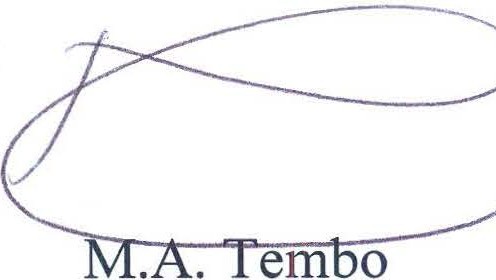

IN THE HIGH COURT OF MALAWI
PRINCIPAL REGISTRY
CIVIL APPEAL CASE NUMBER 48 OF 2016
(Being civil cause number 1058 of 2016 before the SRM at Blantyre)
BETWEEN:
HUMPHREYS MALOLA APPELLANT
AND
ALICE MALOLA RESPONDENT
CORAM: JUSTICE M.A. TEMBO,
Appellant, present and unrepresented
Respondent absent
Mtegha, Official Court Interpreter
JUDGMENT
This is the decision of this Court following an appeal by the appellant following the lower court's decision distributing matrimonial property between the appellant and respondent whom the lower court had found to be husband and wife by repute.
The appellant was not satisfied with the distribution of some matrimonial property that he said he had acquired when he was living with the respondent. He wanted this Court to order that the said property should be his exclusively since it was not part of the property that he had acquired when living with the respondent.
However, on the hearing of the appeal the appellant told this Court that he was no longer interested in the said matrimonial property that was given to the respondent by the lower court namely kitchen utensils, a double bed and a gas jar. The appellant stated that he wanted this Court to order that the respondent give back to him some other property of his which she had converted, namely, a DSTV decoder, an amplifier, speakers, measuring tape and a grinder.
This Court noted that on the record of the lower court there was no dispute pertaining to the claim of conversion that the appellant seeks this Court to determine upon on appeal now. The lower court dissolved the marriage and ordered compensation at customary law and further made ancillary determinations on distribution of matrimonial property, maintenance of the child of the marriage and construction of a house for the respondent.
On hearing civil appeals this Court has the following powers as provided in section 22 of the Courts Act
In a civil appeal the High Court shall have power-
(a) to dismiss the appeal;
(b) to reverse a judgment upon a preliminary point and, on such reversal , to remit the case to the subordinate court against whose judgment the appeal is made, with directions to proceed to determine the case on its merits;
(c) to resettle issues and finally to determine a case, notwithstanding that the judgment of the subordinate court against which the appeal is made has proceeded wholly on some ground other than that on which the High Court proceeds;
(d) to call additional evidence or to direct the subordinate court against whose judgment the appeal is made, or any other subordinate court, to take additional evidence;
(e) to make any amendment or any consequential or incidental order that may be just and proper;
(f) to confirm, reverse or vary the judgment against which the appeal is made;
(g) to order that a judgment shall be set aside and a new trial be had;
(h) to make such order as to costs in the High Court and in the subordinate court as may be just.
The appeal is by way of rehearing. That means this Court will subject the evidence before the lower court to a fresh scrutiny. Of course this Court is always mindful that when sitting as an appellate Court it should never lose sight of the fact that the
lower court had the advantage of determining the credibility of the witnesses first hand.
Considering that the issue now being raised on the appeal was not before the lower court, and is a separate claim of conversion of the appellant's property, this Court dismisses the appeal. The appellant may commence separate proceedings before the lower court on the alleged conversion of property on which both parties can be heard before the lower court determines the issue.
This Court wishes, however, to observed that the manner of proceeding by the lower court raises some fundamental questions. The lower court determined that under the law before the current Marriage, Divorce and Family Relations Act the lower court had jurisdiction to determine divorce cases where the parties were married by repute. This Court's view is that this is not the correct position at law.
The lower court only had jurisdiction to determine marriages under customary law in terms of section 39 (2) which provides that
(2) Notwithstanding subsection (1), no subordinate court shall have jurisdiction to deal with, try or determine any civil matter-
(e) except as specifically provided in any written law for the time being in force, wherein the validity or dissolution of any marriage celebrated under the Marriage Act or any other law, other than customary law is in question.
The jurisdiction is statutory. There was no statute providing for general jurisdiction of subordinate courts over marriages by repute or permanent co-habitation.
Even under the current law as provided in the Marriage, Divorce and Family Relations Act the lower court appears not to generally have the jurisdiction to determine divorce cases where the parties were married by repute or permanent co habitation. Section 2 of the Marriage, Divorce and Family Relations Act defines a court as follows
"court" means the High Court or other court having jurisdiction as specified under this Act and, in relation to any claim within its jurisdiction, includes a traditional or local court;
And section 13 of the Marriage, Divorce and Family Relations Act provides that
A marriage by repute or permanent cohabitation shall only be recognized under this Act upon a finding of a court of competent jurisdiction where that court considers -
(a) the length of the relationship, which, in any event, shall not be less than five (5) years;
(b) the fact of cohabitation ;
(c) the existence of a conjugal relationship ;
(d) the degree of financial dependence or interdependence and any agreement for financial support between the parties;
(e) ownership, use and acquisition of property ;
(f) the degree of mutual commitment to a shared life;
(g) whether the parties mutually have, care for, or support, children;
(h) the reputation of the parties in the community as being married and the public display of aspects of their shared relation; and
(i) any other factors that the court considers fit.
A reading of the preceding provisions and of the rest of the Act shows that section 39 (2)(a) of the Courts Act has not been affected by the passage of the Marriage, Divorce and Family Relations Act in so far as jurisdiction of magistrate courts is concerned. Magistrate courts only have jurisdiction over customary marriages.
This Court wishes to emphasize however that the only time the magistrate courts will have jurisdiction over marriages by repute or permanent co-habitation is when the customary law of the area in issue recognizes such marriages. As required under section 64 of the Courts Act there has to be evidence of such recognition of marriage by repute or permanent co-habitation at customary law. Or else there must be decisions of the magistrate courts or High Court to that effect that the magistrate court can take judicial notice of.
Obviously, the end result of the foregoing is that for marriages by repute or permanent cohabitation, where they are not recognized by a particular customary law, the jurisdiction is with the High Court only and simultaneously great hardship will be caused to people from all far away comers of this country whenever they
want to settle their affairs upon break-down of their marriages by repute or permanent co-habitation. This is an issue that should have been considered critically on the passage of the Marriage, Divorce and Family Relations Act.
The lower court in the present matter determined the questions on compensation and construction of a house by the husband for the respondent by referring to customary law. That was wrong. The marriage herein was not entered into at custom. This is because the marriage herein was by repute as found by the lower court and no evidence was led on the customary law applicable to the marriage by repute in this matter. The lower court should not therefore have made any reference to customary law in its determinations in the absence of relevant proof.
The lower court is accordingly encouraged to be more methodical when dealing with these matters so that the correct legal position is reflected.
Made in open court at Blantyre this 14th October 2016

JUDGE
1